- Home
- Tony Roberts
The Anzac Page 7
The Anzac Read online
Page 7
“Yes sir. Archie, come help me take this kid to the beach.”
Archie muttered irritably but slid down off the ridge and pulled the Turk up by the arm. “Come on, Abdul, walkee-quickee.”
The Turk moaned and looked at the rugged-faced soldier in incomprehension. Casca rattled the bolt of his rifle and jabbed it into the Turk’s ribs. “Now listen,” he said in fluent Turkish, the language familiar to him even though he’d not heard it or used it for almost a century, “you’re going to walk down the hill to the beach. If you try to escape I’ll shoot you. Understand?”
“Yes, effendi,” the Turk said, surprised at hearing an infidel speak his language. “You have the accent of Rumeli, you have lived there?”
“A long time ago,” Casca replied, then waved the barrel of the gun down the hill. “Move.”
“Roman,” the captain said, placing a hand on his upper arm, “you speak their language?”
“Yes sir. Studied it in college back in Canada.”
“Well, we might be able to use you. Report back to me on your return.”
“Sir.”
The three moved off down the steep slope towards the valley, the Turk with his hands on his head – something he was pleased to do as his head was thumping terribly – and Archie and Casca behind him, rifles leveled. Archie grumbled loudly as they went down, complaining about the dark, escorting a prisoner and the cold. “Thought it would be warm here!” he ended.
“Not in winter. Cold as Canada.”
“How cold’s that, you drongo?”
“Enough to kill you if you’re not covered up.”
Archie resumed his mutterings. They got to the bottom and began descending through the gulley. Hills rose to left and right and men could be seen digging in and setting up depots and camps. Casca didn’t like the look of that. It looked as though the landings had stalled less than a thousand yards from the beach. Any Turkish artillery could lob shells onto any part of the beachhead without much effort. They were boxed in.
The beach was a mass of men moving to and fro and equipment being piled up at the water’s edge. The prisoner was handed over to the military police who had set up a base by the edge of the dunes and Casca and Archie were directed to a large store being set up a few hundred yards away. Casca reported to a sergeant who was directing the setting up of the food and water. The sergeant requested in writing any requisition for water, and Casca and Archie complained and begged for some, but the sergeant, now backed by a squad of other clerks, refused point blank.
Grumbling, the two turned away and began their walk back along the beach, avoiding tripping over dark objects thanks to the occasional flickering light set up along the shore. Casca suddenly spotted the hospital and tugged on Archie’s sleeve. “Hey, just a minute, I want to see if someone’s still here.”
“Who?” Archie followed, his long face even longer. He wanted to eat something, drink something, or failing that, smoke something. He was also tired and wanted sleep.
Casca led him to the edge of the hospital and peered in under the flap. The bustle of people was just as confusing, but Casca pushed his way through and headed for the rear. An orderly intercepted him. “You hurt?”
“No, just visiting.”
“Get out of here; wounded only. We’re overworked and we don’t need visitors just yet. Go on, beat it.”
“Just a minute, that’s all I ask…”
“Get going or I’ll get the doctor to throw you out.”
Casca pulled a face and backed out. Archie was grinning. “It’s a girl, isn’t it? A nurse.”
“Not just a nurse,” Casca said, looking back into the hospital wistfully, “a really great looking one. Think I broke the ice with her earlier today.”
“Time yet for that sort of thing, you joker; I can always shoot you in the leg so you can see her.”
“Why thank you,” Casca said, clapping Archie on the shoulder. “If I get that desperate I’ll let you know.”
“She really a great looking Sheila?”
“Yes, and she’s called Alison.” Casca stood staring at the rear of the hospital. Finally he swore and turned away. “C’mon Archie, let’s get back to the lads and tell the captain he’s got to requisition for water. Dumb bastards; they’d rather us die of thirst than supply us.”
The two men turned and began to make their way back to the front line.
CHAPTER ELEVEN
The island of Imbros was a scene of pandemonium. Men were moving here and there carrying a variety of objects; crates, barrels, boxes, poles, ropes, tarpaulins and a hundred of other assorted things. Mules were led through the throng, loaded high with more equipment, adding to the mess with their droppings, urine and churning up the wet earth into a stinking mud.
Imbros was ten miles off the coast of Gallipoli, the perfect and obvious place to use as a forward supply base for the Anzacs fighting on the shores of the peninsula, and also as a secure place to take the wounded so they could be treated in safety away from the guns of the Turks.
Ieaun Clark watched from the deck of the slowly moving supply vessel as it slid towards the hastily erected jetty. He was carrying orders assigning him to the field hospital that was being rapidly set up close to the shoreline just outside the small town near the harbor.
He was nervous. Being the only man who could identify a fugitive soldier wanted for the deaths of British soldiers put a great strain upon him; he wanted to find this van der Laang chap as badly as the military but for different reasons, and he certainly didn’t want him to be put before a firing squad, which would probably be his fate. He was more fascinated by a man who, like Lazarus from the Bible, apparently had risen from the dead and had recovered in an impossibly short amount of time. Van der Laang could be a medical miracle, and he wanted to examine the man. Maybe he would become famous within the medical world. Clark saw his quarry as a passport to greater things for himself. If only he could keep the clumsy mindless military away from things.
His orders were to report not to the senior surgeon, as he might have expected, but to a Captain Hieron, a military policeman. Clark assumed him to be one of the senior officers on Imbros within the police. It would be necessary to liaise with Hieron both as a backup for if and when he needed van der Laang arrested, and to keep his ‘mission’ official. He was sure the captain back in Alexandria wanted to be kept appraised of things and unless Clark kept in touch via Hieron, then questions may well be asked and Clark could himself become the target of a military mission.
Hieron turned out to be a lean, tall red headed man. He had a serious air about him but exuded an air of competence, so much at variance with other members of the British army. Clark handed over his orders to Hieron, together with a sealed envelope addressed to the Captain that had been given to Clark in Alexandria.
After reading both for a moment, Hieron handed back Clark’s orders. He folded the paper that had been addressed to him and placed it in one of his breast pockets. He frowned briefly, arms on the wooden desktop in front of him, then looked levelly at Clark. “A medic on a military mission, under orders to identify a fugitive believed to be serving in the Australian 1st Division at Gallipoli,” he stated, “is not something you get every day. I’m to assist you once you identify this man and provide guards to keep him under arrest until he can be sent back to Alexandria.”
“Yes, Captain,” Clark nodded. “I’m the only one who knows what he looks like.”
“So you are to be assigned to the field hospital here and I’m to make sure all casualties from the 1st Australian are directed to you. I’ll have to have a word with the Senior Surgeon. I doubt he’ll be pleased.”
“Will it cause trouble, then?”
Hieron smiled. Not a smile to encourage one in return. “He’ll co-operate. I’ll make sure of it.”
Clark gulped. Somehow he believed the red-headed captain. He was dismissed and shown where the hospital was, and he pushed into the frantic maelstrom of people, noise and equipment. Clark tu
gged the sleeve of the nearest man who irritably listened, then pointed him in the direction of one of the senior medical staff.
He walked up to a thin, elderly man with grey hair who was directing sweating soldiers to place boxes in particular places. “Sir,” Clark announced his arrival, thrusting yet more papers at him. “Orderly Clark reporting for duty, freshly arrived from Alexandria.”
“Indeed?” the man said without warmth, peering over small round rimmed glasses. He read the paperwork. “Hmmm. This says you’re to be assigned to the Anzac section. You’re Welsh, aren’t you? Not Australian. Odd, I’d’ve put you on the Helles section, dealing with your own countrymen, but Anzac it’ll be. We’re expecting the first batch of casualties tomorrow. Seems they’ve hit a snag over there.”
Clark grunted. It seemed he would be working to identify his quarry almost at once.
The medic examined Clark critically. “I assume you’re up to speed with the latest medical practices? In that case you can act as assistant to Surgeon Major Kendal. He’s over there,” he pointed, “that big man with the large mustache. He’ll be dealing with the Aussies. He’s an Australian himself and doesn’t stand fools easily. So don’t act the fool, Clark.”
“I won’t sir,” Clark nodded, his chin stretching as he grimaced. It would be an interesting day tomorrow.
CHAPTER TWELVE
The shells landed in the sea with a roar, throwing up immense geysers of water and spray. The soldiers ducked involuntarily and watched as the displaced sea reached its apex in an ever expanding cascade before falling back into the heaving Aegean like a particularly vicious local shower.
“Strewth!” Bill Halloran exclaimed, pausing in mid-chew. His mouth remained open, so that the half-eaten bread could be seen hanging in a solid lump from his upper palate. The others made little comment, being more concerned that the salt water didn’t descend upon them and drown their lunch. In the event, the water stayed off the beach, and the group resumed eating.
Casca’s eyes kept straying along the littered, shell-pocked beach to the hospital in the distance. The shingle was littered with smashed equipment, broken crates and boxes, rocks and displaced scrub, and the occasional body. Squads of men on punishment duty were being organized to clean up the debris, but they looked unenthusiastic. Fortunately the Turkish artillery wasn’t firing all that frequently or accurately. It looked to Casca as though they were firing blind.
“Thinking of your girl?” Archie snickered, his long face twisting into an impish grin.
“Maybe,” Casca conceded. “That hospital ought to be off limits to the artillery but I’m wondering whether they can see where they’re shooting.”
“Don’t worry,” Jeb said calmly, “Johnny Turk can’t hit a battleship from ten yards away. Your girl’ll be safe.”
Casca wasn’t convinced. He remembered not that long ago when he was in Flanders the hospital he was in was shelled by the Germans. He wanted to see Alison and talk to her properly. All he’d done so far was to have a brief talk with her while his shoulder was being patched up. He thought that when the British marines turned up shortly after the third day and relieved them, he’d have time to see the nurse.
Some chance. They were called to a camp next to the beach and then given a roll-call. The battalion had been scattered in a number of locations and nobody knew how many had been killed or wounded. Colonel Owen sent out orders to his subordinates to get the numbers and find out how many they had left. Word had come round that day that the battalion had lost seventeen killed and about three hundred wounded. The survivors had been sent to the area close to the beach to recover and regroup. They were to return to the front line that evening under cover of darkness and take up new positions. They had also been warned that they were to dig trenches.
Rocky watched in silence as another shell crashed into the sea, then shook his head. “They think they can keep on bringing replacements by sea when the Turks are shelling it? It’s crazy.”
“The whole thing’s crazy,” Casca commented. “We’re hemmed in with our backs to the sea, sheer cliffs ahead of us, miles from our supply depots and the enemy’s dug in on higher ground with machine guns. Think we’ll break through?”
“Nah. Some drongo of a general will come up with some half-witted plan to get us past them, don’t you worry,” Archie predicted.
“I didn’t think it’d be like this,” Rocky said gloomily. “It was so different at the recruiting office back home.”
Casca grinned for a second. “They never tell you the truth or nobody would sign up.” He thought of an old saying that was around when he was a Roman legionary: War is glorious to those who have never experienced it. Casca thought for a moment who had come up with that one. Some Greek general or philosopher, he decided. Leander, that was his name.
He got to his feet. “I’m off to the hospital tent. If anyone asks where I’ve gone, tell them I’ve gone for a crap.”
The squad laughed. Archie jerked his thumb towards the scrub. “That’s the dunny there, Sandy. They’ll look for you.”
“Dunny?”
“Where you crap. Christ, we’re going to have to teach you to speak Oz properly.”
Casca laughed and walked along the beach, stepping over the cables haphazardly laid on the shingle. Telephone lines had been set up and now writhed their way all over the beach area. He wouldn’t like to try to come this way at night. He’d end up tripping over every one of the damned things.
He went to the rear of the hospital this time. He guessed where the nurses area was and sure enough there was a smaller tent stuck onto the side of the main one. There was an entrance facing the sea and one or two nurses were taking a break, smoking or sat on the shingle chatting. Casca came ambling up, hands in pockets. “Afternoon,” he said cheerfully. “Alison on duty?”
“Who? Alison?” one of the girls replied. She nodded towards the tent. “On duty but I’m due to relieve her in a few minutes. I’ll go tell her you’re here. What’s your name?”
“Tell her Sandy Roman is waiting for her.”
The nurse nodded, finished her cigarette and flung it towards the sea before vanishing into the tent. A few moments later Alison appeared, a surprised but pleased look on her face. “Hello, Sandy, what are you doing here?”
“Want to walk a way?” he held out an arm which she took, and they began walking slowly along the shingle. “We’re regrouping. Tonight we’ll be sent back to the front line but I thought I’d see you before we went.”
“That’s nice of you. You got a cigarette?”
“Sure,” he fished out a pack and passed her one. He lit it and they continued arm in arm, silent of a while. “Expect you’ve been busy today,” Casca said.
She nodded. “Terrible. All of them so young. It’s so sad. How can you stand it?”
“Bravery; stupidity; ignorance. Orders. We can’t exactly say no if an officer commands us to attack. Same for the other side, too.”
“The Turks? They’re savages! Look at the wounds they cause. They must be using terrible weapons to cause such injuries. Some of those young boys have lost legs.”
“Savages?” Casca thought on it a while. The Turks were people he’d fought against plenty of times down the ages. He’d killed plenty, but he’d also gotten to know them. Not as friends, ever, always as enemies. “Tough, stubborn, proud. Yes. Savage? No more than other people in this part of the world. The Serbs are our allies in this war, yet you wouldn’t want to take them on. They’d slit your throat without a thought. The Greeks, Bulgarians, Romanians. All similar. Good friends, terrible enemies. The Turks are only bad because we’re taking them on.”
“Noble words, Sandy,” Alison said forcefully, “but I’ve had to deal with the wounds they’ve inflicted on those poor souls in there.”
“Okay, okay,” Casca said, not wanting an argument. He knew more about wounds than anyone. A Lee Enfield inflicted just as nasty a wound as a Mauser. But Alison wasn’t in the mood to accept that. He nodded u
p at the scrub-covered rocky slopes. “We’re digging in up there so we’re going to be here a while. What orders have you been given?”
“None apart from deal with the wounded. We’re sending the bad cases back to the island of Imbros for better care. The conditions here aren’t good.”
Casca stopped and looked at her. “So what brings you to this God-forsaken hole?”
Alison smiled and exhaled a long plume of smoke. “My brother signed up to fight and I wanted to look after him, so I volunteered to be a nurse. He’s somewhere up there in the trenches, in your division. I think it’s the 2nd battalion.”
“Not mine then. They were fighting to the north of us, I think. You’ve not seen him?”
She shook her head. “Not since Alexandria. We keep in touch by letter, though. And you? What brings you, a Canadian, to this God-forsaken hole?”
They both grinned at that. Casca scratched his head. “Ah. I was in Alexandria and wanted to do my bit for the ‘Empire’. I’d been digging in Egypt when the war broke out. Took me a little while to get to civilization and find the nearest unit to join. So here I am.”
“You an archaeologist?”
“Of sorts. I know history quite well. But enough of that. It’s not often I have the chance to talk to a pretty woman, especially in times of war!”
“Flattery.” Alison threw the butt onto the ground. “I don’t think we’ll have much chance of a romance, do you?”
“No, so we should take what chances we have.” Casca pulled her to him and went to kiss her, but Alison stiffened and pulled away. “No,” she said, “it’s too soon. I don’t know much about you, Sandy. It’s not that I wouldn’t, but what sort of man are you?”
Casca shrugged and smiled ruefully. “A simple soldier, Alison.”
“Yes, one who’s too much in a rush.”
“How long do you think I might have here? Too many of my buddies have died already; more will follow. Who knows if there’s a bullet with my name on it?”

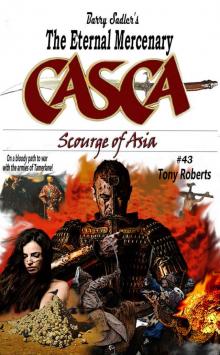 Casca 43: Scourge of Asia
Casca 43: Scourge of Asia The Lombard
The Lombard Casca 49: The Lombard
Casca 49: The Lombard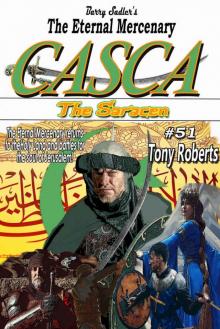 The Saracen
The Saracen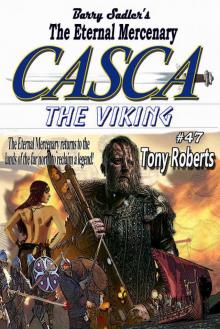 Casca 47: The Viking
Casca 47: The Viking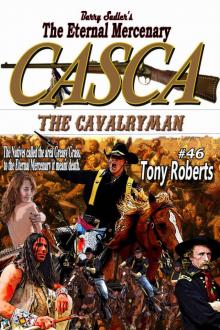 Casca 46: The Cavalryman
Casca 46: The Cavalryman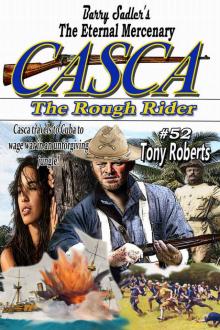 Casca 52- the Rough Rider
Casca 52- the Rough Rider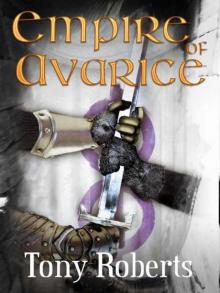 Empire of Avarice
Empire of Avarice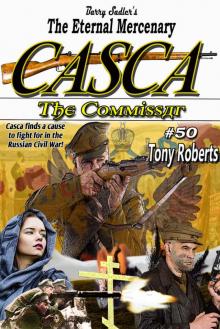 The Commissar
The Commissar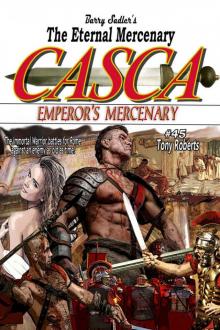 Casca 45: Emperor's Mercenary
Casca 45: Emperor's Mercenary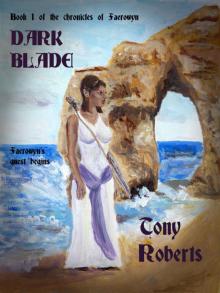 Dark Blade
Dark Blade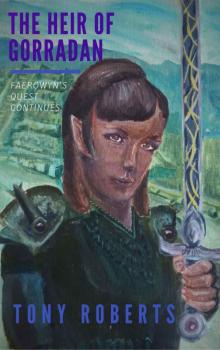 The Heir of Gorradan (Chronicles of Faerowyn Book 2)
The Heir of Gorradan (Chronicles of Faerowyn Book 2)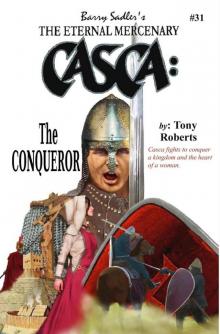 Casca 31: The Conqueror
Casca 31: The Conqueror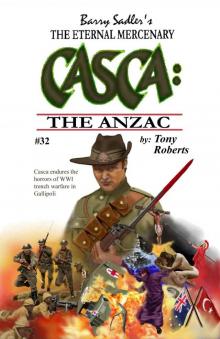 Casca 32: The Anzac
Casca 32: The Anzac The Anzac
The Anzac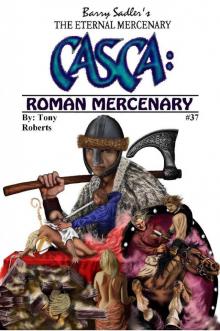 Casca 37: Roman Mercenary
Casca 37: Roman Mercenary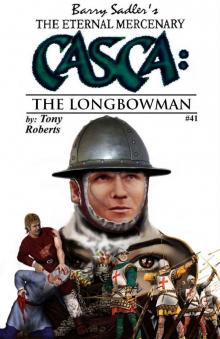 Casca 41: The Longbowman
Casca 41: The Longbowman The Longbowman
The Longbowman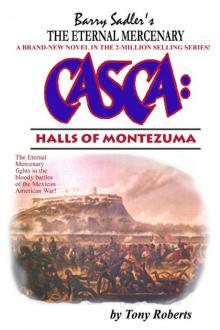 Casca 25: Halls of Montezuma
Casca 25: Halls of Montezuma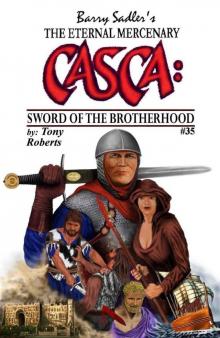 Sword of the Brotherhood
Sword of the Brotherhood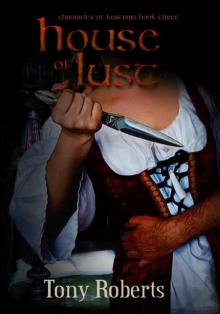 House of Lust
House of Lust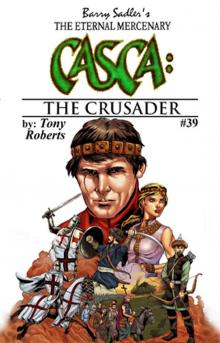 Casca 39 The Crusader
Casca 39 The Crusader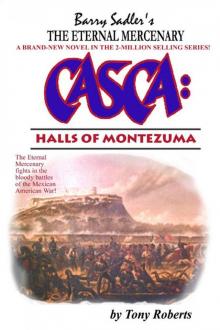 Halls of Montezuma
Halls of Montezuma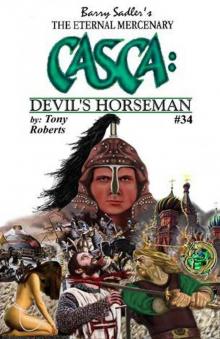 Devil's Horseman
Devil's Horseman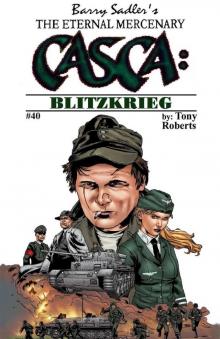 Casca 40: Blitzkrieg
Casca 40: Blitzkrieg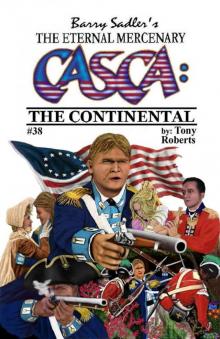 Casca 38: The Continental
Casca 38: The Continental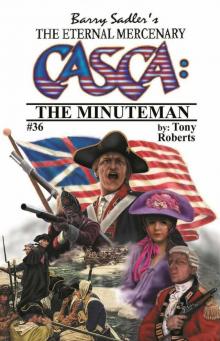 The Minuteman
The Minuteman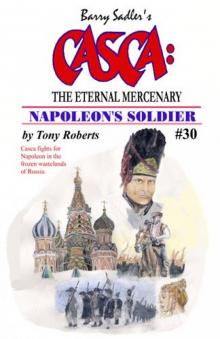 Napoleon's Soldier
Napoleon's Soldier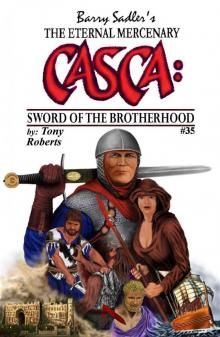 Casca 35: Sword of the Brotherhood
Casca 35: Sword of the Brotherhood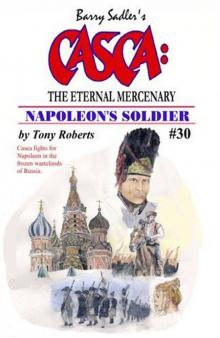 Casca 30: Napoleon's Soldier
Casca 30: Napoleon's Soldier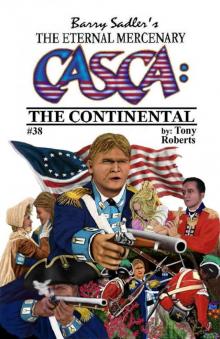 The Continental
The Continental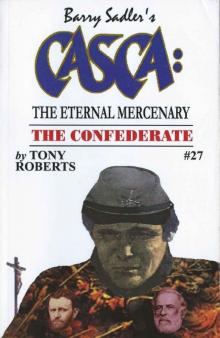 The Confederate
The Confederate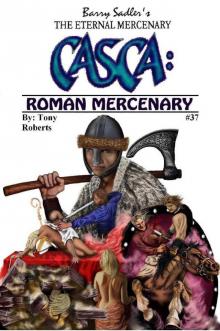 Roman Mercenary
Roman Mercenary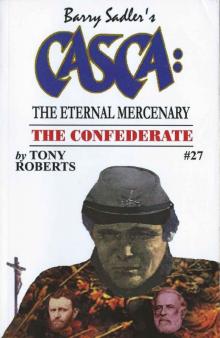 Casca 27: The Confederate
Casca 27: The Confederate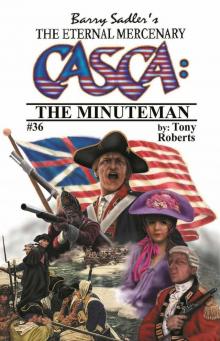 Casca 36: The Minuteman
Casca 36: The Minuteman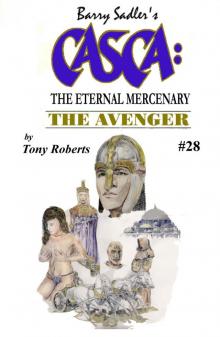 Casca 28: The Avenger
Casca 28: The Avenger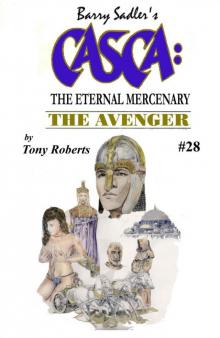 The Avenger
The Avenger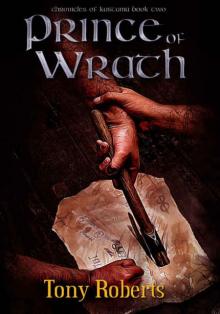 Prince of Wrath
Prince of Wrath